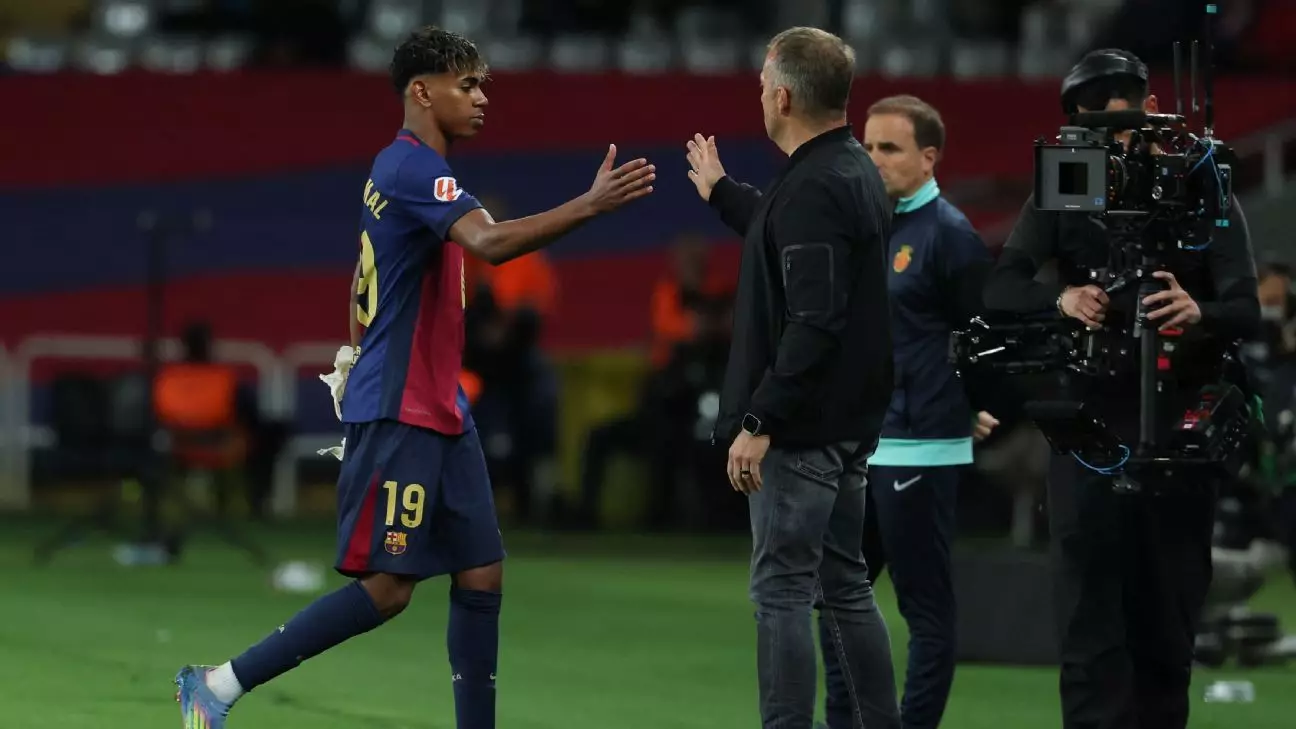In an exhilarating encounter on a midweek night, FC Barcelona secured a narrow yet significant 1-0 victory against Mallorca, a match that showcased not just the skill but the resilience of the team. Despite the overwhelming statistic of 40 shots taken by the Catalan giants—one of the most prolific displays of attacking football seen in La Liga since 2003—the final scoreline could easily mislead an observer into questioning the team’s efficiency. Yet, as evidenced by the nerve-wracking tension that enveloped the Olympic Stadium, this was not just a win; it was a testament to Barcelona’s persistent pursuit of excellence.
Coach Hansi Flick expressed an unusual sense of calm regarding the missed opportunities. His post-match comments reflected a coach well aware of the game’s nuances: “It was 40 shots, maybe not on target, but 40 shots.” This highlights a key aspect of modern football: while statistics such as shots on target can often define a match, the flow of the game, the creation of chances, and the team’s ability to maintain control can be equally decisive. The narrative here isn’t merely about a singular goal; it’s about the relentless spirit displayed on the pitch, even when the ball refused to find the back of the net.
Dani Olmo’s Moment of Brilliance
Amidst the wave of missed opportunities, it was Dani Olmo who provided a moment of insulation against the anxiety that had begun to build among fans and players alike. Striking early in the second half, his tidy finish not only secured the three points but also illuminated his growing importance within the squad. With this goal, Olmo joined the ranks of Barcelona’s double-digit scorers this season, alongside luminaries like Robert Lewandowski and Raphinha. One could sense the relief that permeated the stadium following his objective, and for Flick, it was yet another affirmation of a continuously evolving tactical setup.
This victory, however, was not merely about the numbers on the scoreboard. Olmo’s early goal unlocked an exuberance in Barcelona’s gameplay that had been previously stifled. The offensive cohesion exhibited after the breakthrough was a joy to behold. Nevertheless, it raised questions regarding their finishing capacities, a recurring issue that must be addressed as they progress through pivotal stages of the tournament, particularly with a Copa del Rey final looming on the horizon.
Flick’s Tactical Decisions and Player Management
Flick’s choices reflected a strategic juggling act as he deftly balanced the need for rotation with the imperatives of winning. His decision to rest several key players—such as Frenkie de Jong and Raphinha—demonstrates foresight, acknowledging the need for freshness in a hectic schedule. The sight of Ansu Fati starting for only the second time this season was a poignant moment. After a lengthy injury layoff, his involvement extended beyond mere participation; it symbolized hope and revival. Fati’s contribution, evidenced by his four shots during his 62-minute spell, showcased glimpses of the explosive potential that had previously earned him widespread acclaim.
Flick remarked with optimism, “You can see his teammates also support him. Also the fans… It will help him to have confidence, more belief in himself.” These aren’t mere platitudes; they resonate deeply within the atmosphere surrounding the club. It showcases a belief in teamwork, unity, and the importance of collective motivation, particularly for a young player like Fati. His resurgence is crucial not only for his own confidence but for the dynamics of a squad striving to secure silverware.
The Road Ahead: Mentality Above All
Ultimately, this match served as a reminder of the mental fortitude required to persevere through adversities, a quality that has often characterized successful teams in football history. While the one-goal margin may suggest a lack of potency, the sheer volume of opportunities created indicates a team ready to assert itself in the remainder of the season. The challenge remains not only to convert chances but to consistently evoke performances that combine fluid attacking with disciplined defending, as evidenced by their clean sheet against Mallorca.
As the team prepares for the relentless battles ahead—specifically the Copa del Rey final against arch-rival Real Madrid—the focus should remain resolutely on maintaining this high-octane ethos of attacking play coupled with a resilient defense. In the grand tapestry of football, where narratives are constantly rewritten, this particular chapter for Barcelona can potentially lay the groundwork for substantial future success.

